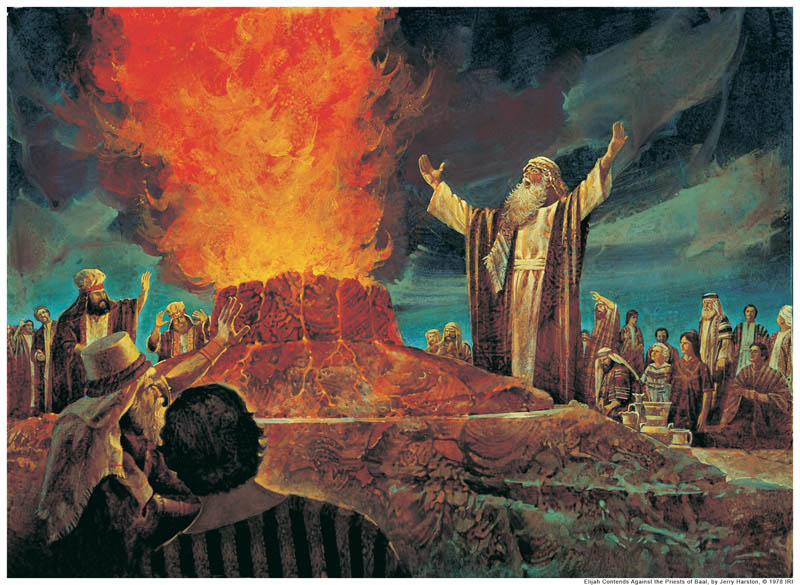Elijah was a great missionary for the Lord. He is held in high esteem within Jewish tradition. In anticipation of Elijah’s predicted return to earth (Malachi 4: 5, 6), a place at the table is set, at every feast of the Passover. The scriptures describe him as a “hairy man” (2 Kings 1: 8) which explains the artist’s impression of him.
About 900 B.C., the kingdom of Judah was ruled by Asa, a righteous king: “Asa’s heart was perfect with the LORD all his days” (1 Kings 15: 14). This good king led his people through forty years of peace and prosperity. During the same period of time, the neighboring kingdom of Israel was ruled by a string of evil kings: Nadab, Baasha, Elah, Zimri, and Omri.
In the 38th year of good king Asa’s reign over Judah, a new king of Israel came to power: “And Ahab the son of Omri did evil in the sight of the LORD above all that were before him” (1 Kings 16: 30). In response to the kingdom of Israel’s great wickedness, the Lord Jehovah called Elijah to a mission: Confront evil king Ahab and call him to repentance.
Doing missionary work in Old Testament times was treacherous–a health hazard. It was customary for evil kings to kill all potential threats to their power (1 Kings 16: 8-11); also, evil kings had a penchant for killing prophets. Thus, Elijah’s mission was very dangerous, especially since Ahab was the most wicked of the evil kings:
“But there was none like unto Ahab, which did sell himself to work wickedness in the sight of the LORD, whom Jezebel his wife stirred up” (1 Kings 21: 25).
Now Ahab’s wife was equally wicked and also had a proclivity for killing prophets (1 Kings 18: 13). Within this risky setting, Elijah confronted the dastardly duo of king Ahab and queen Jezebel.
From its Latin origin, the word “mission” denotes an “act of sending.” A true missionary is always “sent” by the highest Authority. Elijah was a true missionary. He was “sent” by God to do God’s will.
Elijah possessed priesthood power to do the same mighty miracles that Jesus did. Elijah raised the dead (1 Kings 17: 17-23); he caused a widow’s scant food supply to expand beyond its natural course (1 Kings 17: 13-16); and in direct response to the wickedness of Ahab and Jezebel, Elijah commanded the heavens to withhold its rain (1 Kings 17: 1). After three years of “sore famine” in the kingdom of Israel, the Lord directed the prophet to meet with king Ahab:
“when Ahab saw Elijah, that Ahab said unto him, Art thou he that troubleth Israel? And he answered, I have not troubled Israel; but thou, and thy father’s house, in that ye have forsaken the commandments of the LORD, and thou hast followed Baalim” (1 Kings 18: 17, 18).
Armed with the protection and power of God, the prophet boldly asked this question of Ahab and the people of Israel:
“And Elijah came unto all the people, and said, How long halt ye between two opinions? if the LORD be God, follow him: but if Baal, then follow him. And the people answered him not a word” (1 Kings 18: 21).
The word “halt” in this context is fascinating. The verb “halt” means “to be in doubt, hesitate, and waver.” But other meanings for the word halt, e.g., “lame, crippled, or limping,” also apply to Elijah’s inquiry.
Consider the images that arise as the prophet’s question is framed this way: “How long will you be crippled and limp between two choices?” Elijah was exhorting the people of Israel to take a stand once and for all, to walk uprightly before God and cease all limping and wavering.
In contemporary vernacular Elijah might have said: “Don’t be lame brained, make up your mind about your Maker!”
After posing his bold question, what follows is the famous contest between one man of God, and four hundred and fifty pagan priests; a challenge to see which god . . . is God–who’s god will send down fire from heaven and consume a water-soaked sacrifice (1 King 18: 24-39).
It is important to note that the ensuing miracle of consuming fire from heaven did not cause Ahab or Jezebel to repent (in the very same manner that the mighty miracles of Christ did not sway the opinions of those who sought to crucify Him). How is it, that such a denial of God’s amazing might is possible? The answer is found in the following exchange between Elijah and the Lord:
“behold, the word of the LORD came to him, and he said unto him, What doest thou here, Elijah? And he said, I have been very jealous for the LORD God of hosts: for the children of Israel have forsaken thy covenant, thrown down thine altars, and slain thy prophets with the sword; and I, even I only, am left; and they seek my life, to take it away. And he said, Go forth, and stand upon the mount before the LORD. And, behold, the LORD passed by, and a great and strong wind rent the mountains, and brake in pieces the rocks before the LORD; but the LORD was not in the wind: and after the wind an earthquake; but the LORD was not in the earthquake: And after the earthquake a fire; but the LORD was not in the fire: and after the fire a still small voice” (1 Kings 19: 9-12).
” The same still small voice of Spirit that will lead people to correctly answer the bold question of Elijah: “How long halt ye between two opinions?” If Baal be god then follow him, but if the LORD be God, follow Him!


